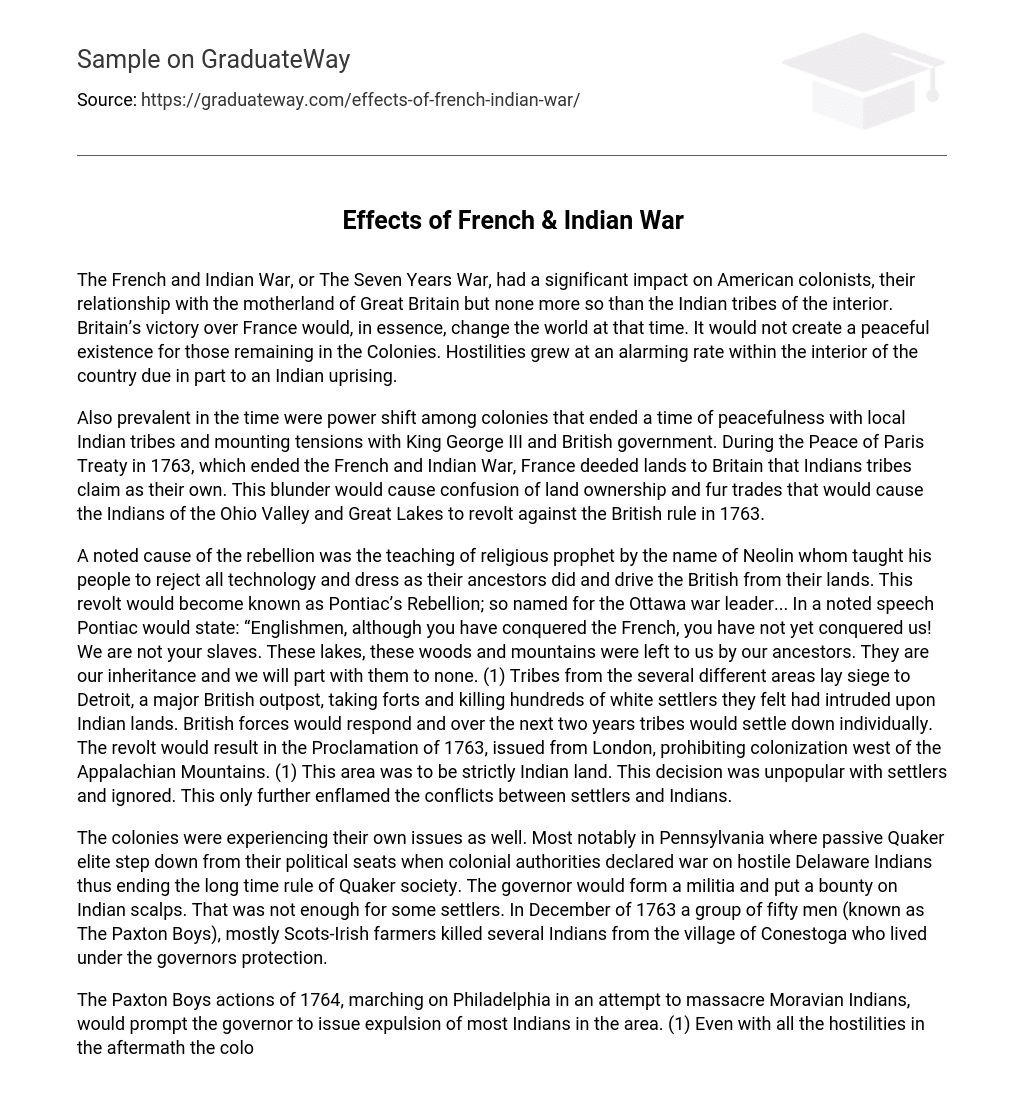The French and Indian War, also referred to as The Seven Years War, had a profound impact on American colonists and their relationship with Great Britain. Additionally, it greatly affected the indigenous tribes living in the interior. The triumph of Britain over France would ultimately reshape the world during that time period. Regrettably, this victory did not lead to peaceful coexistence for those who remained in the Colonies as an Indian uprising caused hostility to rapidly escalate within the country’s interior.
During this time, power shifts among colonies disrupted peaceful relationships with local Indian tribes and caused mounting tensions with King George III and the British government. The Peace of Paris Treaty in 1763, which ended the French and Indian War, resulted in the transfer of lands from France to Britain. These lands were also claimed by Indian tribes, creating confusion regarding land ownership and fur trading. As a consequence, the Indians of the Ohio Valley and Great Lakes regions rebelled against British rule in 1763.
Neolin, a religious prophet, played a significant role in the rebellion known as Pontiac’s Rebellion. He instructed his people to reject technology, emulate their ancestors’ dress, and drive the British out of their lands. The rebellion was named after Pontiac, an Ottawa war leader. Pontiac delivered a notable speech expressing that although the French had been defeated by the English, they had not conquered the native tribes. He emphasized that the lakes, woods, and mountains were their ancestral inheritance and would not be relinquished to anyone.
Tribes from various regions surrounded and besieged Detroit, a major British outpost. They captured forts and killed numerous settlers they believed had encroached on indigenous territory. In response, British forces retaliated, leading tribes to eventually settle down individually over the next two years. As a result of the revolt, the Proclamation of 1763 was issued from London. This proclamation strictly prohibited westward colonization beyond the Appalachian Mountains and designated the area as Indian land. However, this decision faced resistance from settlers and was ultimately disregarded, exacerbating conflicts between settlers and indigenous peoples.
The colonies were facing their own problems too. Particularly in Pennsylvania, the passive Quaker elite relinquished their political positions when colonial authorities declared war on the hostile Delaware Indians. This marked the end of the Quaker society’s long-standing rule. In response, the governor established a militia and offered rewards for Indian scalps. However, certain settlers were not satisfied with these measures. In December of 1763, a band of fifty men, commonly referred to as The Paxton Boys and mainly consisting of Scots-Irish farmers, brutally murdered several Indians from the Conestoga village. These Indians had been living under the protection of the governor.
The Paxton Boys’ actions in 1764, when they marched on Philadelphia in an attempt to massacre Moravian Indians, resulted in the governor ordering the expulsion of most Indians in the area (1). Despite the hostilities that followed, the colonies did experience some positive outcomes from the French and Indian War. This conflict created stronger bonds that would endure and fostered a sense of liberty, which also led to tension between Britain and its American colonies. After the war, during which Britain treated the colonies as equals, King George III of Britain changed his perspective towards the American colonies.
He believed the American colonies should appreciate the money Britain had spent in their fight against the French, and many top British officials agreed with him. However, the implementation of taxes, legal orders, and a variety of new laws, such as the aforementioned Proclamation of 1763, infuriated the American colonies. The Americans argued that they should not be taxed without representation in Parliament, a plea that the British government dismissed as they continued to impose further acts of control. Just ten years later, the Americans would stage a rebellion for their independence.
The French and Indian War had significant effects that cannot be overlooked. It served as a crucial stepping stone for larger historical events that unfolded afterward. During this period, the French surrendered, leading to an Indian rebellion. In addition, white settlers engaged in hostile acts against Native Americans, resulting in their displacement from settled cities. Furthermore, the British government implemented various laws to recover the war’s cost, ultimately sparking The American Revolution and leading to the independence of the newly-formed nation from Britain. The world as we know it was truly reshaped by the profound impact of the French and Indian War.





